- Home
- Charles L. Grant
[Oxrun Station] The Bloodwind Page 2
[Oxrun Station] The Bloodwind Read online
Page 2
It had been the most succulent tobacco she had ever tasted in her life. And when she had returned to the class not one of them had been smiling.
Dears. They were, most of them, dears. They called her Doc with affection, formed and reformed groups around her latest work, her latest exhibitions (depending on tastes, depending on grades), though her only cavil might be their singularly unenthusiastic support for her campaign. She would have thought the creation of a Fine Arts Department devoted entirely to the visual arts would have made them rapturous—in the manner of students who were getting their own way at last. But not them. Or, rather, not all of them. Ollie, Ben, and Harriet, in particular, had somehow decided that she would be chosen to chair this new entity, which in turn would leave them in the hands of someone else.
Silly. They were dears, but they were silly. On all counts.
A prickling, then, at the back of her neck, and she turned her chair around slowly. There was a thick, dark pine shelf attached to the wall beside the door. On it was a statuette just under a foot high—a grizzly half-risen, its great head cocked to one side, massive paws up to strike, its mouth open to reveal gleaming pin-needle teeth. Its name was Homer, the first satisfactory piece she had completed after arriving in Oxrun. A talisman he was, something to be patted wearily before bedtime, to be caressed cheerfully in the morning. Its doppleganger in flesh she had met at dusk in Montana, eight years ago on a trip she had made to cleanse the divorce from her dreams and her child's funeral from her nightmares.
The creature had stood there watching her from the other side of a stream given color by October's early foliage. She had been too terrified to scream, too weak to run, and the grunts it had issued while it paced the grassy bank nailed her to the ground. Then it had reared in a single swift movement, and she had been positive it could have reached across the narrow band of water and swiped off her head with no trouble at all. But it had only watched her and had tested the cold air and had gestured as if were batting at insects. For a full five minutes before it had dropped to all fours and had lumbered into the woodland. She had not moved. She could hear it grunting for what seemed like hours, hear the thrashing of underbrush, hear its paws thunder the earth.
She thought she had died, and had somehow been reprieved.
Now the grizzly was reduced to a gleaming grey-white marble she had quarried herself, back in the hills that coddled the Station on three of its sides. The gleam came not from polishing; it was a quality of stone she had not seen in any other, and it gave the bear a translucence that at times gave it movement, when the lighting was right and she wasn't quite looking. And in its reduction—with eyes deliberately left blank in the ancient manner—it had become a partner, a friend, and a stubbornly silent confidant.
"All right," she told it. "All right, so I'm stalling. Sue me."
Homer simply stood there, testing the air.
Another check of the clock, eight thirty-five and sweeping—and when the telephone rang she nearly dropped her cup. God, she thought as she scraped back the chair, get hold, woman, get hold. She plucked the receiver from its wall cradle and sat again, her right hand curling the cord once around her wrist.
The voice was decidedly masculine: "Was it as good for you as it was for me?"
She couldn't help it; she laughed. "Good morning, Greg."
"Sorry to call so early, Pat, but I wanted to be sure you were ready for battle. After last night, I'm surprised you can still breathe without a machine."
"I can breathe just fine, thank you very much." Her smile began to drift, one corner turning down. "I'm not so positive about the battle, though." She thought of telling him about the ride home, thought of what he would say and discarded the notion.
"Sounds like a good dose of the nerves, huh?"
She nodded, stuck her tongue out at Homer, then blinked and grunted.
"Well, welcome to the club, Dr. Shavers. But listen, I was thinking, see, and the meeting's not until four-thirty, so why don't you and I have lunch or something? Maybe we can get Stephen and Janice to go with us. I mean, we could plan strategy in case the Trustees have shafted us. Like, we could create a minor diversion, like slitting Danvers' throat. That would really throw Constable off his stride, don't you think?"
"I don't know, Greg. Don't you think that's a little drastic?"
"Who for? Danvers? Hell, he'd never notice until he figured out he couldn't lick the dean's shoes anymore."
She laughed again, gratefully and loudly. She knew it wasn't all that funny, knew that poor Danvers wasn't really as bad as they liked to pretend. But apprehension spurred her (and a cold finger of the wind that had pursued her last night), and it was some time before she was able to control herself long enough to thank her colleague for the release and ring off, still chuckling and just as aware as he that she hadn't answered his invitation. He tried too hard sometimes, Gregory Billings did, but somehow he always managed to sense when she needed being silly, needed a willing target for her occasional undirected bitterness, needed to be alone. And it bothered her quite a lot lately that she was often incapable of reciprocating in kind.
Immediately the receiver left her hand, however, she patted Homer's head and walked to the front door, where her fawn overcoat was waiting in the cane rack against the wall. Though her first studio class did not begin until ten, Greg's call had served to magnify the apartment's silence, and her suddenly unpleasant solitude. She was giving herself too much time to think, to worry, and she had no intention of assuming the role of the instrument of her own defeat. She had worked too long and too hard for this day, had yielded the feast possible number of compromises for it all to be wasted just because she didn't have the nerve to leave her own home.
"Darling," her mother had asked just three weeks ago, at the end of her last visit, "I don't understand what you're trying to prove. Don't you realize you're jeopardizing your position at the college with what you're doing?"
Pat hadn't answered. Mother and Father entrenched in their penthouse museum hadn't even understood why she had chosen to come to the Station; how could she expect them to understand her now?
Once the coat was on and buttoned, she grabbed a tasseled white woolen cap and pulled it down over her ears, down to her eyebrows, flung a six-foot white muffler cavalierly around her neck, and drew leather-palmed gloves over her long fingers. The door closed behind her, and she tested the lock—more often than not she didn't bother to use it. A bad habit, perhaps, but she had never felt other than safe in the Station.
It was done. She was out. There was no turning back.
She stood on the front porch and allowed the damp cold to attack her, pulling stiffly at her cheeks and nose, stinging her chin, slipping beneath her skirt to tighten her calves and thighs.
Her blouse turned to ice.
She tucked her purse under one arm and shoved her hands into her pockets.
Like most of Oxrun Station this side of the huge park, Northland Avenue was lined with homes ranging from gingerbread Victorians to stately Dutch Colonials, all of them considerably bulky, all of them maintained in scrupulous repair. The lawns were broad, the trees ancient and massive, the inhabitants with few exceptions well enough off not to worry about the direction the rest of the country was taking. A self-contained street in a self-contained community that carried its wealth like a topcoat well worn.
She inhaled slowly, deeply, the last of the evening's punishment driven to hiding by the chill, the last remnant of her scare made ludicrous by daylight. Behind her the house loomed quietly, the bay windows on either side primly white-curtained and reflecting the pale new sun in each of the square panes. Two blocks to her right the street dead-ended at the fencing of the town's cemetery; two blocks west the traffic on Mainland Road was easing as commuters gave way to those just passing by. Directly across Northland, old man Stillworth was sweeping snow from his walk, puffing whitebreath like smoke and grumbling loudly at his broom about New England's insane weather. The block's children wer
e already in school, but their spirits remained hovering around abandoned sleds on porch steps, in snowmen guardians behind hedges, in a stray red mitten propped atop an evergreen shrub. The steady clanking of a snowplow several streets over. The frigid call of a bird. The brittle slam of a door.
Nothing had changed during the night, then. It was definitely safe to leave. The ritual she'd inaugurated the day she'd moved in was completed in the space of a few familiar seconds.
She took the steps cautiously, one hand out for balance while the other held her purse. Goldsmith had already cleared the inlaid stone-block walk to the pavement, had already overspread patches of ice with lumps of salt. She shuddered when she estimated the hour he must have risen in order to do it before the others had left for work, and she decided the man should be struck a special medal. Not that he would accept it, even in. jest and good humor. He was very much the recluse, keeping to his own rooms most of the day as far as she could determine, shambling out only when there were repairs to be done, grass to be mowed, the back garden to be weeded.
He was indeed amazing—just like her performance the night before.
She had been at the Chancellor Inn with Greg, Stephen DiSelleone and Janice Reaster. It was Janice's twenty-ninth birthday, and the intention had been to have a quiet celebration while Janice—who was a lecturer and art historian—bemoaned her imminent plunge into the infamous thirties. Within an hour after they'd ordered, however, as more of the faculty had wandered in with spouses and dates, the party had blossomed to a boisterous two dozen. DiSelleone took to the piano, Janice to her quavering voice, and what had once been a grand farmhouse trembled for hours.
She had drunk too much, flirted too often, had eased her car from the parking lot just after midnight so incredibly slowly she hadn't believed she was really driving. It hadn't been a long ride—one block north to Steuben, right one block to Northland, and a time-frozen skid as she wrenched the station wagon left.
The snow. And the wind. And someone . . .
A clumsy U-turn to remind her of her condition, and a near-collision with Stillworth's tin garbage can to send her further into panic.
Amazing she had not slammed into a tree.
Amazing she'd been able to get into the driveway at all, much less manage it so the car was facing back out toward the street.
God takes care of little children and idiots, she thought as she walked, and was halfway up the drive when something about the car struck her as being wrong. It was small, squared, all of a dove grey with a chrome luggage rack on top. And it was clean. Perfectly clean. She looked over her shoulder and saw only the tracks of her boots in the light dusting that covered the blacktop. There were no tire marks, no bird tracks, no indication of any kind that anything mechanical or otherwise had come back here since the end of the flurry. Kelly and Abbey, she realized, must have parked their cars at the curb instead of in the garage, though she did not recall seeing it when she'd come home last night. And Lincoln had evidently decided a good wind would do his work for him before the next fall broke from the clouds.
She shook her head once and sharply, dispelling an image of a giant picking up the station wagon and carrying it safely back here. That was foolish. She had driven it here herself. And it had been snowing; it had been windy, and she had sat here watching it while she'd tried to rein her nerves.
So it must have been the wind that had erased the car's tracks. That only made sense. Nevertheless, the unsettling sensation prodded her into walking around the vehicle slowly, checking the tires, brushing stray flakes from the edges of the window . . . and stopped when she saw the dent in the passenger door.
"God . . . damn!" She crouched and traced the concavity with a finger. The surface hadn't been cracked, nor were there any signs of whatever it was she'd struck: no pieces of bark, no chips of chrome or paint, just a shallow indentation centered and oval. She straightened and jammed her hands on her hips. "I don't believe it. My god, I don't believe it."
She kicked at the door with the side of her foot and boxed an ear with an open palm. Then she stalked back to the driver's door and yanked it open, slid in with a scowl. It took her several moments before she could insert the key and fire the engine. Another full minute before her hands stopped trembling in rage. It certainly wasn't the first time she'd drunk too much at a party, but she had never before been so befuddled that she'd endangered herself to the point of having an accident without even knowing it.
She thought of the wind, of the grumbling, of the snow.
Her anger turned to Greg—why had he permitted her to drive home in her condition? She didn't recall him emptying his glass so terribly often. So why the hell hadn't he stopped her? Why hadn't he at least gone with her, or forced her to walk home, or filled her with black coffee before letting her out?
She held her breath, her cheeks puffed and her fingers strangling the beveled steering wheel.
Her eyes closed tightly and she directed herself to review the drive home, from the moment she had backed cautiously onto Chancellor Avenue to the moment she had backed into the driveway. And her eyes snapped open as she bit down hard on the inside of her cheek— she could not remember. Somewhere during the drive she had struck something hard enough to damage her car. But she could not remember it. Unless it was . . . the garbage can. Instead of narrowly missing it, she must have sideswiped it. She must have. But the memory of the impact was just not there.
Her shoulders slumped as a slithering cold not born of the winter or the snow made its way into her stomach and curled there, aching. It was the pressure, of course. Bucking the system and fighting her memories and battling her parents and fending off Greg—it was the pressure, just the pressure that had lashed down her caution and allowed her all that drink.
And the consequence of that was a kind of selective amnesia induced by the liquor, and made firm by guilt. She did not want to remember having the accident because it was stupid and it was embarrassing and it underscored something that might possibly become a problem.
With no desire to remember . . . she didn't.
"Yes," she whispered, and grinned her relief. "God, what a fool!"
She shifted to a less rigid, more comfortable position, glanced around the car, and scowled at the small pebbles lying on the black mat on the passenger side. Figures, she thought; for all the work she put into keeping the car clean, her stumbling around the last few days had soured even mat. She thought to open the other door and brush them out, changed her mind and decided to do it later. After she came home and apologized to Stillworth. She would offer to buy him a new garbage can, and he would be furious, as usual, but she would take the fury as part of her punishment. For now she was thankful she hadn't found any blood.
3
SHORTLY after the turn of the twentieth century, Ephraim Hawksted and a handful of his closest associates decided the children of Oxrun Station should not have to be denied a superior post-secondary education simply because they happened to live in a remote section of the state where travel was difficult and expectations high. He was also the guardian of a long-standing grudge born the afternoon he'd been refused entrance to both Harvard and Yale (Princeton, of course, was out of the question, being out of New England). Though he could have attended any one of the smaller and no less prestigious colleges in the Northeast, the gall of the twin giants in forbidding him study soured him to the point that he'd made his fortune without a degree. He regretted it. He felt incomplete. And despite any number of examples of similar men with similar successes, he felt almost embarrassed there was no sheepskin on his wall.
He called in debts, then, favors owed and obligations outstanding, and within twelve months had founded a two-year community college which, for its time and ambition, proved singularly more than adequate for the training of dedicated teachers and shrewd mid-level businessmen.
It wasn't until the end of the Second World War, however, that it became evident to Hawksted that not only was two years insufficient for the co
ntemporary world, but also the students themselves were increasingly reluctant to transfer to other institutions. The mark of Oxrun had taken firm hold of one arm, while the other was in the grip of their unquestionably remarkable education.
On his deathbed the old man suggested two years double to four, and when he finally died in 1953 no one complained publicly when the school's name was changed—especially in light of the trust he had established to maintain the facilities independent of the vagaries of economic and enrollment flux. The only conditions were two: that all the trustees be natives of the Station, and none of them be graduates of Harvard or Yale.
The two-hundred-acre campus was two miles east of the last street on Chancellor Avenue, a stretch of road on the way to the depot bordered by thick woodland on the right and barriers of the Station's estates on the left. Pat paid little more than automatic heed to the blur of brown as she drove. She concentrated instead on the slight damage to her station wagon, on the upcoming meeting, on the work she needed to begin with her classes. Her radio was tuned to a classical-music station, and the passages of strings, the lilt of muted horns, lulled her, calmed her, and when she turned right between a pair of massive stone pillars topped by flaring eagles she was almost ready to face it all without shrieking. Her grip loosened on the wheel, her spine grew less rigid, and as the road canted upward to a gentle incline she rolled down the window to catch the sharp scent of pines that lined the narrow blacktop.

![[Oxrun Station] The Orchard Read online](http://i1.bookreadfree.com/i/03/17/oxrun_station_the_orchard_preview.jpg) [Oxrun Station] The Orchard
[Oxrun Station] The Orchard![Riders in the Sky - [Millennium Quartet 04] Read online](http://i1.bookreadfree.com/i/03/20/riders_in_the_sky_-_millennium_quartet_04_preview.jpg) Riders in the Sky - [Millennium Quartet 04]
Riders in the Sky - [Millennium Quartet 04]![Chariot - [Millennium Quartet 03] Read online](http://i1.bookreadfree.com/i/03/19/chariot_-_millennium_quartet_03_preview.jpg) Chariot - [Millennium Quartet 03]
Chariot - [Millennium Quartet 03]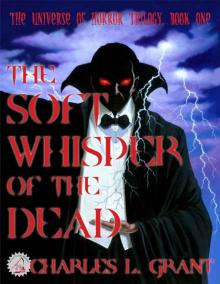 The Universe of Horror Volume 1: The Soft Whisper of the Dead (Neccon Classic Horror)
The Universe of Horror Volume 1: The Soft Whisper of the Dead (Neccon Classic Horror)![[Oxrun Station] Dialing The Wind Read online](http://i1.bookreadfree.com/i/03/19/oxrun_station_dialing_the_wind_preview.jpg) [Oxrun Station] Dialing The Wind
[Oxrun Station] Dialing The Wind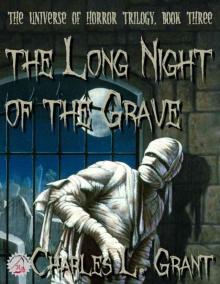 The Universe of Horror Volume 3: The Long Night of the Grave (Neccon Classic Horror)
The Universe of Horror Volume 3: The Long Night of the Grave (Neccon Classic Horror)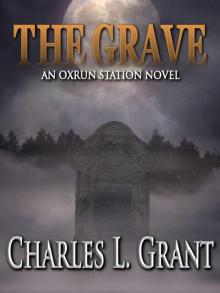 The Grave - An Oxrun Station Novel (Oxrun Station Novels)
The Grave - An Oxrun Station Novel (Oxrun Station Novels)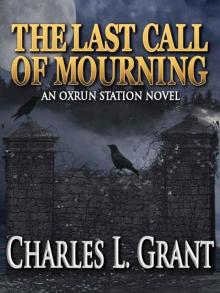 The Last Call of Mourning - An Oxrun Station Novel (Oxrun Station Novels)
The Last Call of Mourning - An Oxrun Station Novel (Oxrun Station Novels)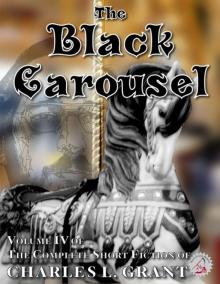 The Complete Short Fiction of Charles L. Grant, Volume IV: The Black Carousel
The Complete Short Fiction of Charles L. Grant, Volume IV: The Black Carousel The Bloodwind - An Oxrun Station Novel (Oxrun Station Novels)
The Bloodwind - An Oxrun Station Novel (Oxrun Station Novels)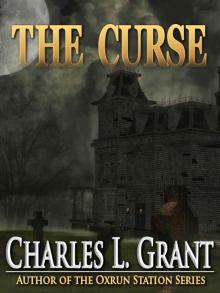 The Curse
The Curse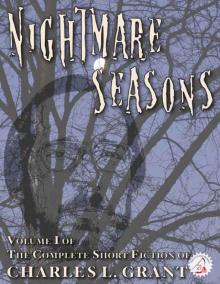 The Complete Short Fiction of Charles L. Grant Volume 1: Nightmare Seasons (Necon Classic Horror)
The Complete Short Fiction of Charles L. Grant Volume 1: Nightmare Seasons (Necon Classic Horror)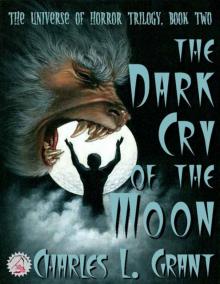 The Universe of Horror Volume 2: The Dark Cry of the Moon (Neccon Classic Horror)
The Universe of Horror Volume 2: The Dark Cry of the Moon (Neccon Classic Horror) Watcher: Based on the Apocalypse (World of Darkness : Werewolf)
Watcher: Based on the Apocalypse (World of Darkness : Werewolf)![[Oxrun Station] The Bloodwind Read online](http://i1.bookreadfree.com/i/03/25/oxrun_station_the_bloodwind_preview.jpg) [Oxrun Station] The Bloodwind
[Oxrun Station] The Bloodwind The Orchard
The Orchard Night Songs
Night Songs Shadows 3
Shadows 3![Symphony - [Millennium Quartet 01] Read online](http://i1.bookreadfree.com/i1/04/02/symphony_-_millennium_quartet_01_preview.jpg) Symphony - [Millennium Quartet 01]
Symphony - [Millennium Quartet 01] The Hour of the Oxrun Dead (Necon Classic Horror)
The Hour of the Oxrun Dead (Necon Classic Horror)![In the Mood - [Millennium Quartet 02] Read online](http://i1.bookreadfree.com/i1/03/31/in_the_mood_-_millennium_quartet_02_preview.jpg) In the Mood - [Millennium Quartet 02]
In the Mood - [Millennium Quartet 02]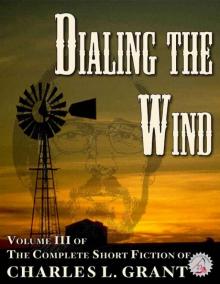 The Complete Short Fiction of Charles L. Grant Volume 3: Dialing the Wind (Neccon Classic Horror)
The Complete Short Fiction of Charles L. Grant Volume 3: Dialing the Wind (Neccon Classic Horror)![[Oxrun Station] The Last Call of Mourning Read online](http://i1.bookreadfree.com/i2/04/05/oxrun_station_the_last_call_of_mourning_preview.jpg) [Oxrun Station] The Last Call of Mourning
[Oxrun Station] The Last Call of Mourning The Pet
The Pet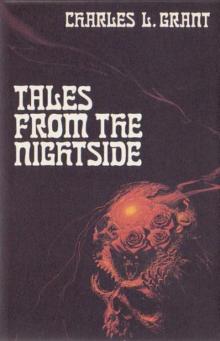 Tales from the Nightside
Tales from the Nightside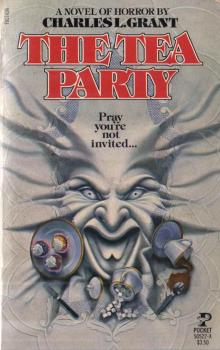 The Tea Party - A Novel of Horror
The Tea Party - A Novel of Horror The Complete Short Fiction of Charles L. Grant Volume 2: The Orchard (Necon Classic Horror)
The Complete Short Fiction of Charles L. Grant Volume 2: The Orchard (Necon Classic Horror) Whirlwind
Whirlwind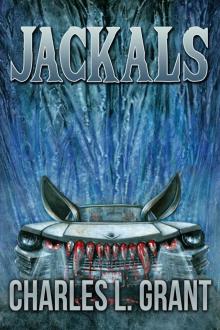 Jackals
Jackals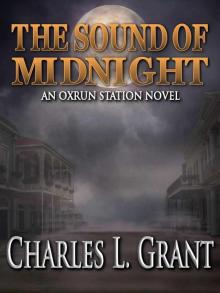 The Sound of Midnight - An Oxrun Station Novel
The Sound of Midnight - An Oxrun Station Novel